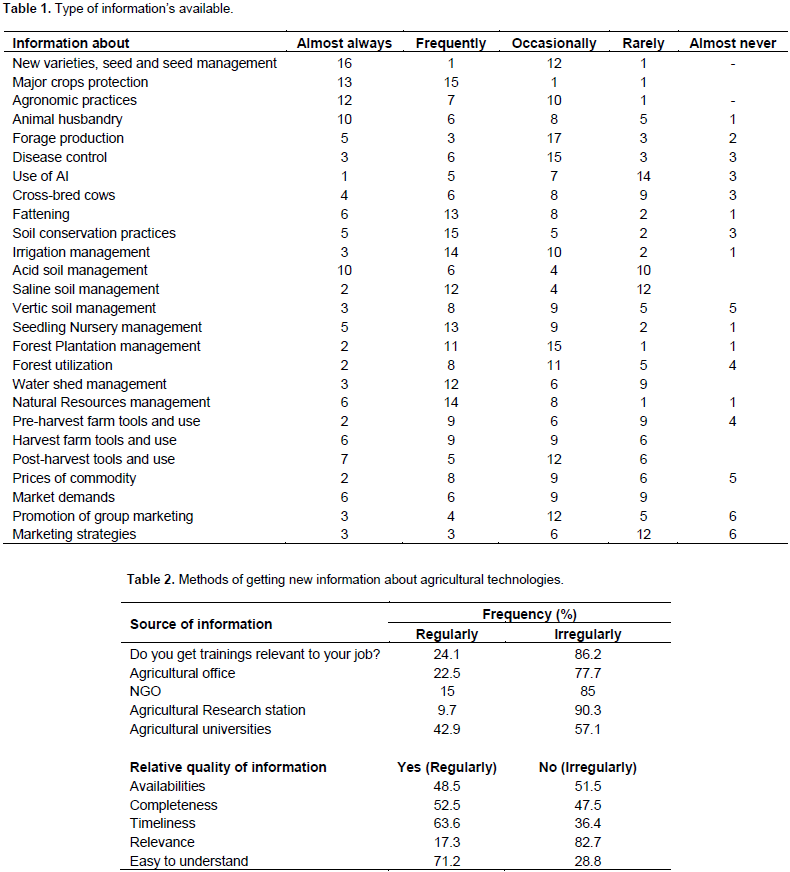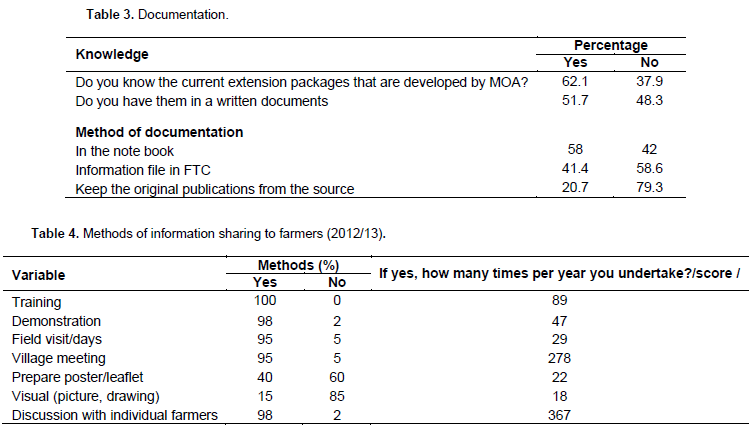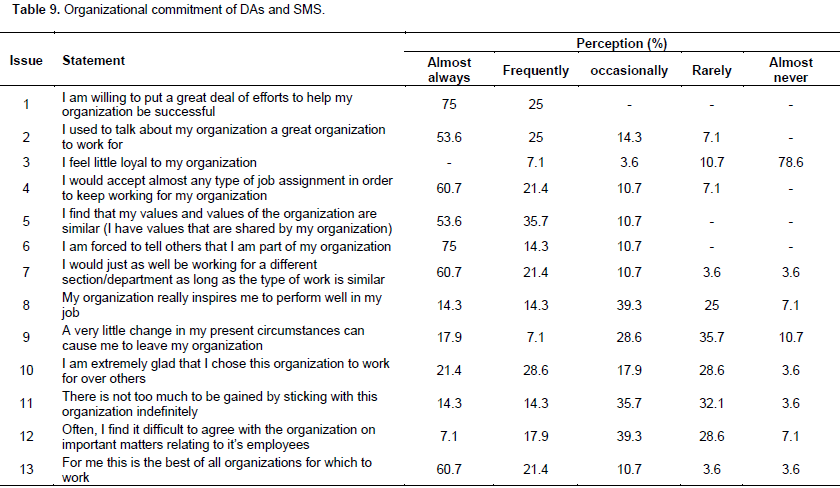ABSTRACT
The study aims to assess the effectiveness of the current agricultural information management system and communication, and the gap between required and available information to extension personnel at central highland of Ethiopia. Consulting with head of districts agricultural office, 5 to 6 farmers training center (FTC) from Welmera and Ejera districts were selected randomly. 92 development agents and eleven subject matter specialist who were working in each FTC and bureau of agricultural were interviewed. And researchers also collected qualitative data. For data analysis, descriptive statistics tools were used. In the study area, 75% of development agents (DAs) and subject mater specialist (SMS) got new and updated information frequently and occasionally. Even though, more than half of the respondents know the current extension packages that are developed by Ministry of Agriculture (MOA), they lack documentation. Moreover, development agents and subject matter specialist are less satisfied on promotional opportunity and rewarding system in their organization. The overall finding of the study underlined less availability of regular trainings on new agricultural technologies, less availability of promotional opportunities and rewarding system to DA and SMS, documentation and fewer office equipment problems at FTC level in the area. Therefore, agricultural research center and Ministry of Agriculture should provide problem solving trainings on new agricultural technologies and media design techniques regularly, reconsider salary, promotional opportunities and rewarding system of DA and SMS, supervision of documentation system at FTC level, and furnishing FTC office would help to improve the current agricultural information system in the area.
Key words: Development agents, agricultural knowledge, farmers training center, source of information.
Agricultural information system can influence agricultural production and productivity in different ways. It can help inform decisions regarding land, labour, livestock, capital and management. According to Rolling (1998), an agricultural information system is generated, transformed, transferred, consolidated, received, and fed back in such a manner that these processes function synergistically to underpin knowledge utilization procedures. Agricultural productivity can arguably be improved by relevant, reliable and useful information and knowledge. Hence, the creation of agricultural information (by extension services, research, education programs and others) is now often managed by agricultural organizations that create information systems to disseminate information to farmers so that farmers can make better decisions in order to take advantage of market opportunities and manage continuous changes in their production systems (Demiryurek et al., 2008). Supporting this, Vijayaragavan and Singh (1997) and Halim and Rosa (2017) consider that management information system in the agriculture can help farmers to:
(1) Plan the effective resources to cultivate the land and its crop
(2) Choose the best alternatives to produce and take part in the cultivation
(3) Manageable day to day operations for processing the land.
Ethiopia is one of the developing country; agriculture is seen as the backbone of the economy. The government of Ethiopia has planned different strategies to improve the agriculture sector in the country. Some of the strategies are opening vocational agricultural training centers, recruiting different field development agents in each peasant association and building the capacity of agricultural officers are some of the strategies to improve the agricultural sector in a country.
Development agents and subject matter specialist personnel can get agricultural information from different source and use it to improve the production system of farm households. Agricultural productivity can arguably be improved by relevant, reliable and useful information and knowledge (Demiryurek et al., 2008). To manage and improve the current agricultural information system there is a need to understand the source, availability and use of agricultural information. So, this study deals with assessing the effectiveness of the current information management system and communication, the gap between required and available information to extension personnel, major bottlenecks in the process of agricultural information management, and to suggest possible options on how effective and efficient information management and chain could be developed in welmera and Ejera districts.
A multi stage sampling procedure was employed to select respondents. Welmera and Ejera districts were selected purposively. Consulting with head of districts agricultural office, 5 to 6 farmers training center (FTC) from Welmera and Ejera districts were selected randomly. The questionnaire was pre-tested before administering on the selected sample agricultural personnel’s. Depending on the findings of pre-tests, some modification was made on the final version of the interview schedule. Nineteen two development agents and eleven subject matter specialist who are working in each FTC and bureau of Agricultural were interviewed. By using descriptive statistics, quantitative data types were analyzed and qualitative data also interpreted.
Required and available information to extension personnel
In the study area, 75% of development agents (DAs) and subject mater specialist (SMS) had new and updated information frequently and occasionally (Table 1). Specifically, all respondent got information on new varieties, crop protection, agronomic practice, acid soil and saline soil management, watershed management, harvesting and post-harvest tools, and marketing respectively. On the other hand, 86.2, 90.3, 85, and 77.7% of respondents got information on relevant trainings, agricultural research station, non-governmental organization (NGO) and agricultural offices. In addition to that, 82.7 and 51.5% of respondents mentioned that the information gotten were not relevant, and were not available. However, 71.2, 63.6 and 52.5% of them revealed that the information gotten was easy to understand, delivered on time and relatively complete (Table 2). From this study, it was observed that development agents are working in an office that is not well furnished. And they lack the necessary skill to prepare materials that will be easily understood by farmers. Generally, the collected information’s from different development agencies are less valuable to change the agricultural practice of farm households.

Information storage and processing
To sustain the agricultural information and knowledge transfer among experts, each information should be filed and documented in an appropriate way. Even though more than half of the respondents knew the current extension packages that are developed by Ministry of Agriculture (MOA), they lack filing in an organized ways (Table 3). According to Table 3, 58, 41.1 and 20.7% of the respondents response were documented in a note book, filed in FTC, and the original publications from the source were kept. Consequently, the aim of achieving fast agricultural development in a country would become lager and inconsistence. The aim of organizing consecutive training to development agents is to equip them to change the living standard of farm households. And it is assumed that each development agents transferred the knowledge they acquired by using different teaching methods. According to Table 4, more than 90% of agricultural experts used training, demonstration, field visit and village meeting as methods of information sharing to farmers. More frequently, they used village meeting as information sharing methods per season. Using village meeting more frequently would encourage farmers to accomplish each activity through participation and with common understanding.

Perceptions on agricultural information management
Every professional has his own perception towards availability, access of information/training and improved agricultural technologies given by other organizations. Agricultural development and subject matter specialist evaluated the current information management system in their organization. According to Table 5, 41.7 and 75% of the respondents got adequate information for their extension work and early access to some useful information from research center and other institution. Even if respondents have different perception on agricultural information system, all the respondents had the ability to customize the information gotten for easy understanding. Regarding improved agricultural technologies, development agents and subject matter specialist had reflected on their attitude in different ways.

According to Table 6, more than 40% of respondents had strongly agreed on issues mentioned on 2nd, 3rd and 10th. Similarly, on issues of ‘using improved agricultural technologies is rewarding’ and ‘improved agricultural technologies fit well in our existing conditions and practices’, 67.9 and 46.4% of them disagreed. On the other hand, 57% respondents disagreed on ‘there are ample choices of improved agricultural technologies for farmers of the area’. Generally, agricultural experts agreed on improved agricultural technologies would help to achieve fast agricultural development. But they pointed out less availability of technologies choices in the area.

Job satisfaction, motivation and commitment
Job satisfaction
From the sampled respondents, 53.6, 57.1 and 53.6% of the respondents were highly satisfied regarding ‘the recognition given to their work and profession in the work place and in the community’, ’with the effective total time you devote to your profession’ and ‘with being recognized as professional expert in your field’ issues (Table 7). On the other hand, agricultural experts are slightly dissatisfied on 2nd, 3rd and 6th issues. This issue includes being less satisfied on promotional opportunity and rewarding system in their organization.

Job autonomy
It is believed that every profession should develop theirjob carrier by taking different kinds of training. Trainings would help the employee to accomplish their day to day activities independently and efficiently. As shown in Table 8, 64% of the interviewed agricultural experts said something about scheduling their own work. Even if they have a say on scheduling there day to day activities experts reported that they are a little bit overruled by assignment. This might lead the professionals to become less efficient and productive on their career.

Organizational commitment
Every organization wellbeing highly depends on the availability of committed and motivated worker. And workers commitment would lead the organization to contribute more to needy citizens in a country. Since agricultural workers are directly linked to farmers, their commitment on organization vision, mission and goal play a great role for food security and poverty alleviation in a country. According to Table 9, 75, 78.6 and 60.7% of workers are seen to be making efforts to help their organization, being loyal and working for a different section/department as long as the type of work is similar. Similarly, more than 60% of respondents always feel they are trying their best. Moreover, as indicated in the 9th issue, more than 30% of workers would not change their organization even if little change occurred in an organization. On the other hand, 39.3% of them occasionally feel their organization does not inspire them to perform well in an organization.

The aim of organizing consecutive training for development agents is to equip them to change the living standard of farm households. And it is assumed that each development agents transferred the knowledge they acquired by using different teaching methods. However, training delivery system to development agents is not persistent. Even if the information’s collected from different development agencies are presented in a simple manner they are still found to be less relevant to change the agricultural practice of farm households. Moreover from the study observation, majority of the development agents are working in an office that is not well furnish. And they lack the skill to prepare the information in a more easy and attractive ways to the surrounding farmers. To improve these scenarios, different media designs techniques have played a great role to transfer information’s in an easier way than written and oral form of transferring information. Some development agents are also less satisfied by promotional opportunities in their organization. This disaffection made the current agricultural information system less smoother. Generally to improve the current agricultural information system conducting problem solving trainings on new agricultural technologies and media design techniques regularly, reconsider salary, promotional opportunities and rewarding system of DA and SMS, supervision of documentation system at FTC level, and furnishing FTC office would help to improve the current agricultural information system in the area.
The authors have not declared any conflict of interests.
REFERENCES
|
Demiryurek K, Erdem H, Ceyhan V, Atasever S, Uysal O (2008). Agricultural information systems and communication networks: the case of dairy farmers in Samsun province of Turkey. Inf. Res. 13(2):343.
|
|
|
|
Halim BD, Rosa D (2017). Stakeholder Definition for Indonesian Integrated Agriculture Information System (IAIS). IOP Conf. Ser.: Mater. Sci. Eng. 185:012014.
|
|
|
|
|
Rolling N (1998). Extension science: information system in agricultural development. Cambridge: Cambridge University Press.
|
|
|
|
|
Vijayaragavan K, Singh YP (1997). Managing Human Resources within Extention. (Rome: Food and Agriculture Organization of the United Nations).
View
|
|